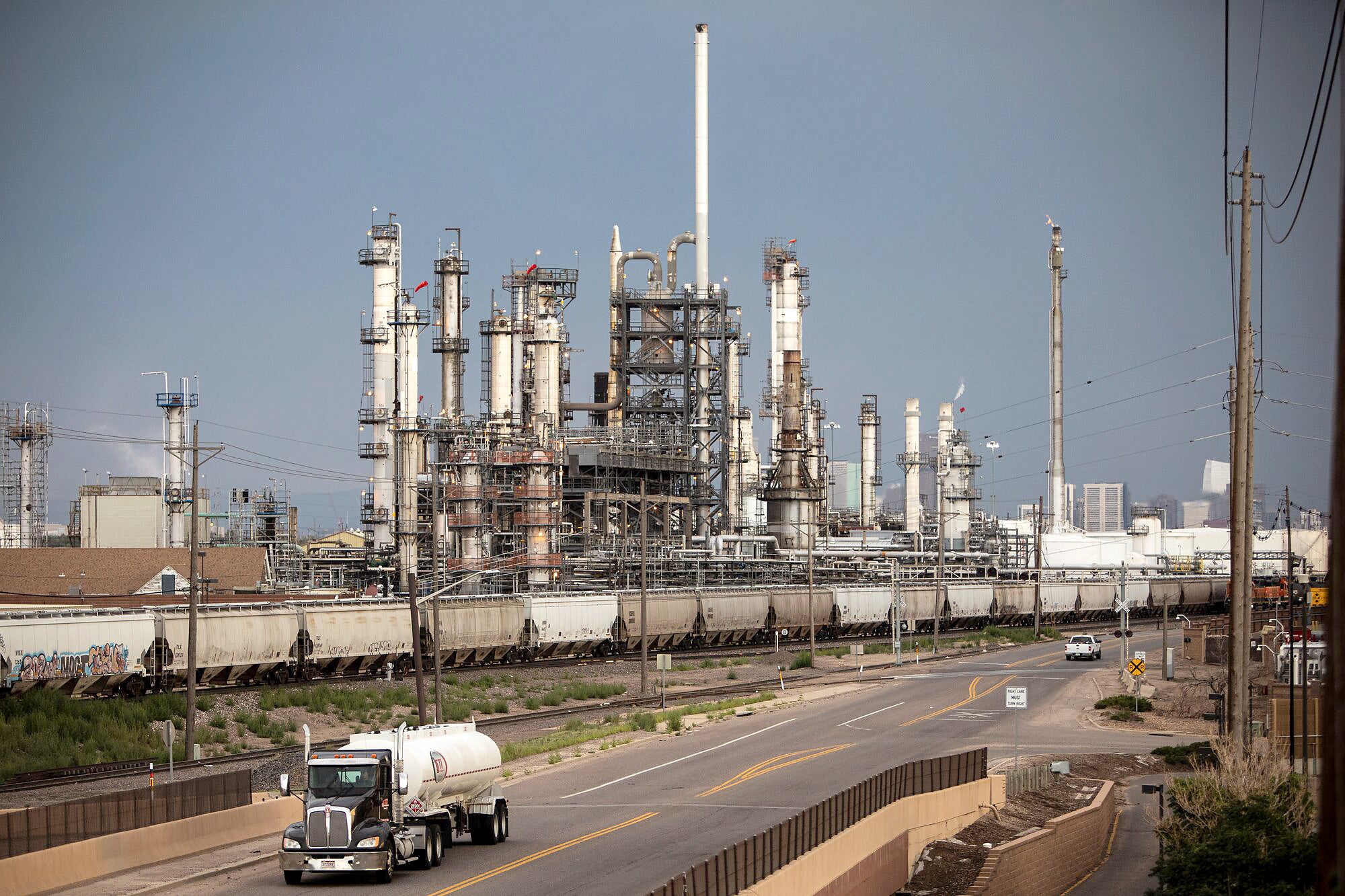Conservation and Environmental Justice Groups File Administrative Appeal of Suncor Water Permit
Groups seek lower PFAS limits and shorter compliance schedules to help protect communities
Contact
Conservation and environmental justice groups on Friday filed an administrative appeal challenging aspects of the Suncor refinery’s Clean Water Act discharge permit. Groups argue that the permit, which was issued by the Colorado Department of Public Health and Environment in March, sets a PFAS limit which is too high, has inadequate PFAS monitoring requirements, gives Suncor far too long to come into compliance, and fails to prevent groundwater seepage of benzene and PFAS into Sand Creek and the Burlington Ditch.
“Water is all connected,” said Ean Thomas Tafoya, Colorado state director for GreenLatinos. “From the river comes drinking water and the growth of crops. When we divide water for regulation and allow more pollution it ultimately impacts everything downstream, especially when we are discussing persistent toxic chemicals like PFAS. Our members downstream are concerned so we are taking steps to protect them.”
While the groups applauded the inclusion of a new PFAS limit for the first time in the permit, they also raised concerns about the 70 ppt limit being too high. In setting the PFAS limit, the state relied upon a 2016 health advisory level from the Environmental Protection Agency that recommended 70 ppt limits. However, in 2022, the EPA issued an updated health advisory that recommends PFAS levels that are significantly lower than the 2016 advisory. The groups are challenging CDPHE’s failure to revise the Suncor permit to reflect these stronger 2022 health advisory levels.
Relatedly, the groups are also concerned that Suncor will not be required to adequately monitor its PFAS discharges. Though the permit sets a daily maximum limit for Suncor’s PFAS discharges, it only requires Suncor to test the discharges once per week.
PFAS is a class of “forever chemicals” that persist in the environment and build up in the human body over time. PFAS are linked with severe health effects including cancer, reproductive and development harm, and immune system suppression. A significant pathway of human exposure to these toxic chemicals is through drinking water.
“In alignment with Denver Trout Unlimited’s mission of transforming the Denver South Platte from Chatfield Dam to 120th Avenue into a vibrant, urban river boasting a thriving multi-species gamefish fishery, we fully endorse efforts to strengthen the Suncor refinery discharge permit,” said Nic Hall, president of Denver Trout Unlimited. “This involves integrating the latest scientific findings and implementing measures that offer optimal protection for residents and users of Sand Creek and the South Platte River, all while adhering to pertinent laws and regulations. It is imperative that we vigorously defend Denver’s stretch of the South Platte River and its tributaries, ensuring that residents can safely enjoy recreational activities in its revitalized waters.”
The groups are also challenging the timeline the state provided Suncor to comply with pollution limits. While the permit imposes several new discharge limits, it provides a very long time for the company to comply with them. The permit provides a three-year compliance schedule for the 70 ppt PFAS limit and a six-and-a-half-year compliance schedule for some other pollutants. The groups argue these lengthy compliance schedules are inconsistent with federal regulations and CDPHE policy. Suncor has already had years to address these issues: the process for this permit has taken years, and the draft of the new permit was issued more than two years ago in November 2021.
“It’s frustrating to see Colorado regulators disregard the latest science and advisory from EPA with this new Suncor permit,” said Ramesh Bhatt, chair of the Colorado Sierra Club Conservation Committee. “Suncor is now allowed to dump forever chemicals into waterways for years. When combined with the lax monitoring requirements in the permit, this pollution will endanger the health and wellbeing of downstream communities that rely on the water. It is far past time for CDPHE to act expeditiously and take serious action to reduce pollution from Suncor.”
The groups noted that the state failed to include permit limits for contaminated groundwater beneath the refinery that is likely seeping into nearby Sand Creek and the Burlington Ditch. CDPHE confirmed that such seeps from groundwater can be regulated under the Clean Water Act, but the final permit simply requires monitoring and studies to confirm whether these discharges are occurring. If Suncor does identify any discharges, it will be required to apply for permit modifications addressing them. Substantial evidence shows that these groundwater seeps are already occurring and the state’s approach to this issue will allow Suncor years of delay in addressing them. Groups hope to strengthen the permit to minimize delay and provide Suncor with an incentive to prevent such discharges.
“While Suncor’s water permit takes steps in the right direction, it does not go far enough, quickly enough, to protect surrounding communities,” said Michael Freeman, senior attorney with Earthjustice’s Rocky Mountain Office. “We are filing this administrative appeal to ensure that Suncor’s water permit accounts for the latest science and holds Suncor accountable for cleaning up its act in a timely manner. Community health depends on the state issuing the strongest possible permit for this long-standing polluter.”
Suncor has operated under discharge permits that were issued in 2012 for a five-year term. CDPHE has allowed the company to continue operating under the existing permits for nearly 12 years while it processed the refinery’s renewal permit. A draft of the renewal permit was released in 2021 and CDPHE took another two years to issue the final permit.
Earthjustice represents GreenLatinos, Trout Unlimited, and Sierra Club in the appeal.

Additional Resources
About Earthjustice
Earthjustice is the premier nonprofit environmental law organization. We wield the power of law and the strength of partnership to protect people's health, to preserve magnificent places and wildlife, to advance clean energy, and to combat climate change. We are here because the earth needs a good lawyer.